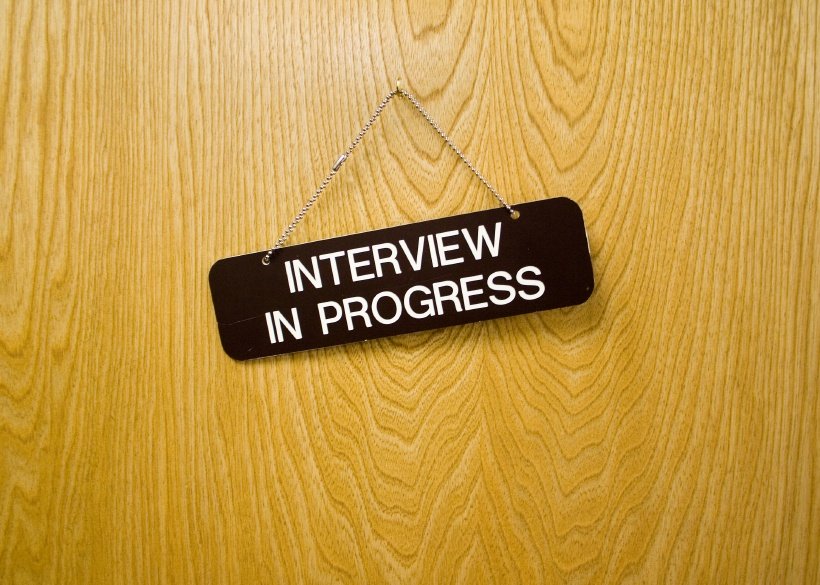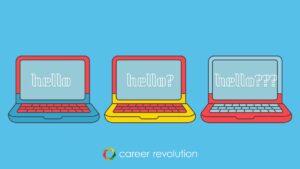Honesty is the best policy, but have you ever been a little too honest in an interview? On the other end of the spectrum, have you ever padded your resume with exaggerated accomplishments?
Interviewing stresses most people out, especially if they’re new to it or haven’t been in the interview chair in a bit.
Don’t undo all of your job search preparation by letting your nerves get the best of you. In this article, we’ll detail three modes interviewees enter when feeling nervous at an interview.
Don’t miss your next job opportunity because you let your nerves take over.
How to Stop Nerves From Causing Too Much Honesty in an Interview
Unfortunately, when we’re nervous, we can enter several unhelpful modes. Three common modes are panic, prattle, and potty mouth.
- Panic: When an interviewee clams up and can’t answer questions at all.
- Prattle: When an interviewee nervously rambles on and on to fill the awkward silence. By the end of the sentence, they forgot what question they were addressing in the first place.
- Potty Mouth: When an interviewee lets one of those choice four-letter words into the chat.
How Honest Should You Be in an Interview?
Right off the bat, let’s set one base rule. Don’t lie.
Some of the biggest interview flubs happen when an applicant sets false expectations. If you pad your resume with a small lie that you describe as “a matter of nuance,” ask yourself why. Are you simply padding your resume with meaningless accomplishments and inconsequential skills? Try to keep things honest. Being caught lying on your resume can have a big consequence.
The strange thing about interviews is that, ultimately, you want the interviewer to like you. For better or worse, hiring managers arrive with their own set of biases. They might have an unconscious bias for people named Julie with brown hair. As an interviewee, that’s not a problem you can solve for.
However, you can follow a few common-sense guidelines to soothe the judgments coming from even the biggest Julie-hating interviewers.
Every now and then, I find myself conducting an interview that generates a mental text, “OMG, LOL!” due to the level of personal disclosure from the candidate.
Know the Difference Between Honesty + Oversharing
I continue to be amazed at how much I’ve learned about a person, unrelated to the job, by asking simple interview questions.
Although it’s important to come across as authentic, there’s a fine line between being honest and revealing aspects of your personal life as part of a nerve-ridden info-dump. Don’t let conversational chatter turn into TMI.
I’ve created the guide below based on real interview responses I’ve personally experienced. These answers made me think twice about how well the candidate might fit into the company or new position.
However, the biggest mistake I see candidates make is trying to be too honest. In doing their best to answer each question honestly, they might lose credibility, badmouth former employers, or reveal some little white lies contained in their resume.
The Interview is a Stressful Experience
The interview is a stressor. In some situations, an interviewer might be equally nervous, especially when new to management.
This is why it’s important for all parties to conduct some pre-interview preparation. Many interviews include the same common interview questions. As an interviewee, don’t take a gamble by skipping the preparation stage.
| When asked… | Honest | Too Honest |
| Why you have a long gap in time between jobs. | You explain you used that time to earn a professional certificate, finish your MBA, care for children, or even took a sabbatical to travel throughout Europe to study art. | You say you were unemployed because you wanted to experience one last summer with your besties before making a full-time commitment. |
| Why you’re looking to leave your current job. | You tell the employer you’re looking for an opportunity with more growth potential, are ready to take on a new challenge, or have been with your current company for 2 years and would like to apply that knowledge in a new industry. | You tell the employer you got passed up for a promotion because your boss has it out for you because of some gossip they heard you’d said about them, which was really made up by a backstabbing co-worker that’s mad at you because you flirted with their significant other at the company holiday party. |
| What you like to do with your spare time. | You talk about sporting activities, art interests, coaching the community little league, trying new restaurants and community groups or activities you participate in. | You detail your repetitive trips to Indian Casinos, your reputation for making the best martinis in your building, or recent online dating disasters. |
| What your ideal workday looks like. | You explain you like to collaborate with others, have focused time on yourself, and continuously prioritize work so you can meet deadlines, keep a regular exercise routine and effectively balance work and family priorities. | You tell the employer you need an hour and a half lunch on Mondays and Wednesdays to take a yoga class, aren’t a morning person, or like to be logged out by 5 pm on summer days so you can still enjoy the beach for the season. |
| What type of team or culture you’re most productive in. | You provide examples of past teams you worked in that were successful; “I once worked on a team that met weekly to solve new problems and another where everyone was accountable for their project deliverables”. | You provide examples of past teams you worked on that were unsuccessful; “I worked on a team of slackers where I end up doing all of the work. I never want to do that again!” |
Interview Preparation Tips
Gather actual memories from workplace scenarios, especially how they can relate to important workplace skills (e.g. problem-solving, teamwork, critical thinking)
- Know your most important job skills and prepare to talk about them. Ditch your anecdotes about the more inconsequential skills.
- Prepare to talk about your hobbies and interests, especially if they relate to the job at hand.
- Center your goals, especially when speaking about this particular opportunity. get excited and use your imagination to align your goals with this job. Get wrapped up in talking about that to dazzle a hiring manager!
- Speak about all former jobs and organizations in a positive light. Even if you hated your last boss and role, find a way to generate a positive response.
- Mind your body language. While this may feel completely uncomfortable, try filming yourself answering common interview questions. Keep an eye on your body language, with special attention to posture and eye contact.
Almost everyone has been guilty of disclosing a little too much or perhaps not enough in an interview at one time or another. Below are simple interview tips to help you maintain a good balance in your next interview.
How to Talk About Yourself with Authenticity + Honesty
Below are simple interview tips to help you maintain a good balance in your next interview.
- Define your personal brand – Before you interview have a clear picture of your top 3 strengths, personal values, and how you’ve applied them in the past to achieve results. You should be able to clearly and briefly articulate the value you bring to the organization.
- Be authentic – Effective interviewing is all about being you and connecting your talents and experiences to the needs of the position and company culture. You don’t need to have all of the answers. Instead, focus on real experiences you’ve learned from.
- Don’t panic – If you’ve ever given a “bad answer” to an interview question, it’s not over. If you’re still in the seat in front of their interviewers, take a breath. Ask for a do-over. Why not? This shows that, while you may be battling nerves, you intend to provide thoughtful answers. Give your thoughtfulness time to catch up to and eliminate your nerves.
- Stick to the facts – Always provide accurate dates, degrees, and career history like titles and organizations you worked for.
- Practice and prepare – You can use the questions in the chart above to practice articulating your opinions and experiences into statements that are true, yet also professional. Avoid preparing canned responses; rather focus on having a variety of real examples at your fingertips.
Small lies can have big consequences. Your personal brand can be at risk if you’re inaccurate with facts.
However, you can do even more damage to your personal brand if you can’t distinguish authenticity from disclosure of every detail about your life just because it happened. There are times when it’s best to stick to the facts and not spill your guts—interviewing is one of them.
In conclusion, Practice really does make perfect.







